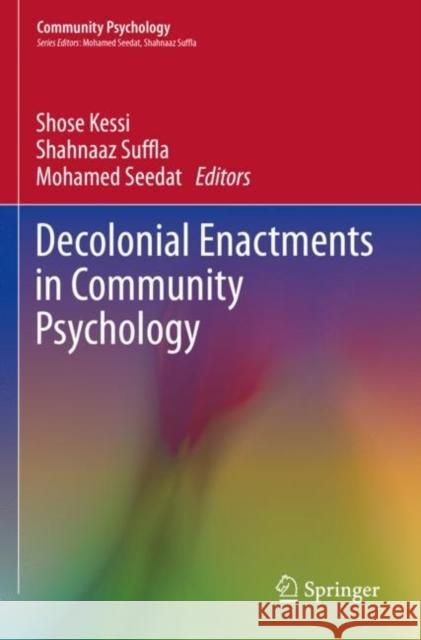Decolonial Enactments in Community Psychology » książka
Decolonial Enactments in Community Psychology
ISBN-13: 9783030752033 / Angielski / Miękka / 2022 / 280 str.
Decolonial Enactments in Community Psychology
ISBN-13: 9783030752033 / Angielski / Miękka / 2022 / 280 str.
(netto: 536,72 VAT: 5%)
Najniższa cena z 30 dni: 501,19
ok. 16-18 dni roboczych.
Darmowa dostawa!
This edited volume in the Community Psychology Book Series emphasizes applications of community psychology for disrupting dominant and hegemonic power relations. The book explores domains of work that are located within critical community psychology, as well as work that is conventionally not self-defined as community psychology but which draws on and contributes to the foundations and enactments of critical and liberatory community psychology. Specifically, the book advances conceptions and praxes for community psychology grounded within a decolonial framework. The volume heeds the call for a generation of approaches to community psychology that link local struggles to broader questions of power, identity, and knowledge production, bringing together examples of praxes from different contexts as a political project of highlighting indigenous struggles toward self-determination. Collectively, the chapters in this book embody a decolonial agenda for community psychology that foregrounds social justice; the lives and knowledges of the marginalized and oppressed; epistemic disobedience and transdisciplinarity; and decolonial aesthetics. The book is divided into two parts - Part I: Conceptions of Engagement for Community Psychology delves into the conceptual framework for a decolonial community psychology, and Part II: Modes of Enactments and Praxes for Community Psychology builds on these theoretical advancements through examples of praxis in different contexts. The audience for the book includes scholars, researchers, practitioners, activists, and students located within community psychology specifically, as well as disciplines within the health and social sciences, and arts and humanities more broadly.
This edited volume in the Community Psychology Book Series emphasizes applications of community psychology for disrupting dominant and hegemonic power relations. The book explores domains of work that are located within critical community psychology, as well as work that is conventionally not self-defined as community psychology but which draws on and contributes to the foundations and enactments of critical and liberatory community psychology. Specifically, the book advances conceptions and praxes for community psychology grounded within a decolonial framework. The volume heeds the call for a generation of approaches to community psychology that link local struggles to broader questions of power, identity, and knowledge production, bringing together examples of praxes from different contexts as a political project of highlighting indigenous struggles toward self-determination. Collectively, the chapters in this book embody a decolonial agenda for community psychology that foregrounds social justice; the lives and knowledges of the marginalized and oppressed; epistemic disobedience and transdisciplinarity; and decolonial aesthetics. The book is divided into two parts - Part I: Conceptions of Engagement for Community Psychology delves into the conceptual framework for a decolonial community psychology, and Part II: Modes of Enactments and Praxes for Community Psychology builds on these theoretical advancements through examples of praxis in different contexts. The audience for the book includes scholars, researchers, practitioners, activists, and students located within community psychology specifically, as well as disciplines within the health and social sciences, and arts and humanities more broadly.











